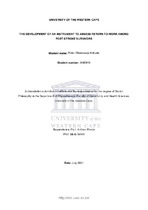| dc.contributor.advisor | Rhoda, Anthea | |
| dc.contributor.author | Ibikunle, Peter Olanrewaju | |
| dc.date.accessioned | 2022-01-25T09:05:58Z | |
| dc.date.available | 2022-01-25T09:05:58Z | |
| dc.date.issued | 2021 | |
| dc.identifier.uri | http://hdl.handle.net/11394/8652 | |
| dc.description | Philosophiae Doctor - PhD | en_US |
| dc.description.abstract | Return-to-work (RTW) after an injury or illness is influenced by physical, psychological and social factors. Therefore, a need exists to develop a contextualized multi-perspective and objective measure for the assessment of return-to-work among stroke survivors. This current study comprised three phases, with each phase intended to address various objectives in the process of developing and validating a psychometrically sound measure, to assess return-to-work in stroke survivors. In the first phase, qualitative data collection methods were employed with various stakeholders and key informants, to finalise the conceptualisation, scale construction, and domain identification of the intended instrument. In-depth interviews were conducted with stroke survivors, their caregivers, employers and rehabilitation professionals. The data generated were analysed using the Atlasti.version 7. The results were used to construct the instrument. | en_US |
| dc.language.iso | en | en_US |
| dc.publisher | University of Western Cape | en_US |
| dc.subject | Disability | en_US |
| dc.subject | Reliability | en_US |
| dc.subject | Stroke | en_US |
| dc.subject | Return-to-work | en_US |
| dc.subject | Stroke rehabilitation | en_US |
| dc.title | The development of an instrument to assess return-to-work among post-stroke survivors | en_US |
| dc.rights.holder | University of Western Cape | en_US |

